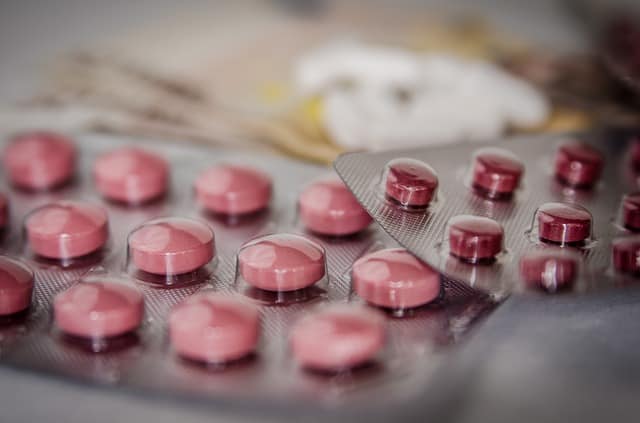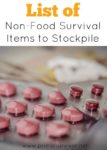With the surge of disasters that have hit the country in the past few years, Americans are finally waking up to the need to stockpile emergency supplies.
Even if you can make it to a supermarket during a disaster, items are going to disappear off the shelves quickly – and you might even have to fight your way to get products.
So, you MUST have non-perishable foods, like canned goods and a lot of water stockpiled to help you get through a disaster (get a list of foods to stockpile here).
But, sorry to break it to you: stockpiling food isn’t going to be enough to get you through a long-term disaster.
Here is a list of non-food items you will also need to stockpile.
Hygiene Items
Hygiene isn’t just a matter of smelling nice while you wait out a disaster. If you get dirty, then it can become a serious health risk.
Of these items, the most important will be buckets and trash bags to serve as a toilet. You can read more about survival hygiene and how to make an emergency toilet system here.
First Aid Items
Please make sure you read our post about first aid items and have a first aid kit packed at home and a lightweight first aid kit for your Bug Out Bag too!
If you haven’t already, I highly recommend taking a course in first aid. Otherwise, all of these supplies will be pretty much useless in a true emergency situation. Learn skills like how to dress a wound, CPR, set a splint, and which medications to give.
Other Supplies
- Duct tape and WD-40: Seriously, is there nothing that these two tools can’t fix? (Also see WD40 alternatives)
- Rope and cord: Have a variety of types of rope, including paracord, in your stockpile
- Tools: A box cutter, hammer, screwdriver, wrench, and other tools will come in handy if you need to make last-minute repairs or improvise a solution
- Nails and Screws: You’ll want these for making furniture or shelters or doing repairs
- Candles, flashlights
- Heater: Check out these emergency heater options.
- Stove: How will you cook without power? Here are some stove options.
- Batteries
- Plastic sheeting: Great for things like repairing a broken window or collecting water.
- Pens, pencils and paper
- Entertainment: A deck of cards is small and can provide lots of entertainment. I’ve also included some How-To books and manuals in my emergency supplies stockpile
- Socks and underwear: You can get by wearing the same clothes for a few days, but you definitely don’t want to wear dirty socks and underwear. That will cause some nasty chaffing and infections.
- Water filters: Recommended reading – How To Choose The Best Survival Water Filter
- Bleach: This is useful for hygiene reasons and also for purifying water if you don’t have any filters left
- Lighters, matches, and fire starters
- Fuel: Read this article about off-grid cooking methods
- Ammo, weapons and self-defense items: You might also want to stock up on supplies like barbed wire if you need to set up a defense around your home. Pepper spray is a great non-lethal self-defense item.
- Face mask: An N95 face mask will protect your airways from contaminants in the air.
Barter Items
For a true SHTF situation, you will want to have some items to barter with. Ideally, a barter item should be in demand, but you know how to make yourself, such as soap or candles.
Even if you have an excess of something now, you might end up needing it later – so try not to barter away items that you can’t replace.
Read our post about the top barter items.
Getting Started with Stockpiling for Survival
As you can see, this list is pretty long – and this is only the non-food items you should be stockpiling!
Depending on your personal needs, you will probably want to add many items to the list.
So how are you supposed to get started with stockpiling?
I understand that most people have budget and space constraints with stockpiling, but that shouldn’t prevent you from getting started.
Start slowly. When you go shopping and notice one of these items on sale, buy a few extra. Over time, your prepper stockpile will add up. You can also make a list of items by priority.
In terms of priority, you will want to focus on these items:
- Water
- Food
- Toilet paper + buckets for toilet
- Lighting
- Heating/Warmth
- First Aid
- Hygiene items
As far as space goes, I’m lucky enough to live in a fairly large home with a basement. But I used to live in a small apartment, so I know what it means to be restricted in terms of space.
Consider getting rid of all that clutter you have in your home and use the space for the survival items you really need.
What items did I miss? Let me know in the comments below.









